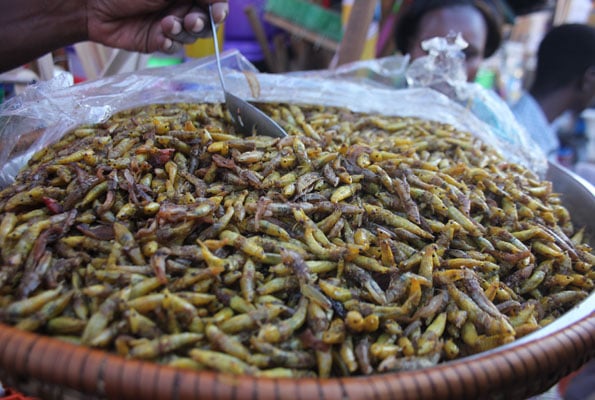Prime
Mystery of missing nsenene revealed

A man walks past a grasshopper trap on Grant Street in Masaka City on November 15, 2023. PHOTO/ MALIK FAHAD JJINGO.
What you need to know:
- On social media, there have been hilarious, tongue-in-cheek suggestions that the government may have sold the sought-after insects to the Chinese.
as the country settles into lighthearted banter over the mysterious disappearance of grasshoppers this season, climate experts yesterday blamed the rains for the missing, widely popular delicacy.
On social media, there have been hilarious, tongue-in-cheek suggestions that the government may have sold the sought-after insects to the Chinese! Others ‘feared’ the nsenene have decamped to other, less hostile climes in silent protest against teargas for which the police is jokingly blamed.
Even President Museveni has joined in the good humour, wondering about their whereabouts in his latest ‘missive’.
“This is Museneene (the month of the grasshoppers). Where are they? Climate change? I do not eat the nsenene. However, I always wish the nsenene, the fish eaters etc, good luck. Inform me when the nsenene appears…,” he wrote on the messaging platform, X, yesterday.
More seriously, the Uganda National Meteorological Authority yesterday said ongoing heavy rains have affected the seasonal grasshoppers. In September, 2023 was declared an El Nino year with the weatherman warning Uganda would experience significantly above normal rainfall.
Mr Yusuf Nsubuga, a senior meteorologist, explained that grasshoppers cannot reproduce in wet weather, hence their absence.
“October is where we usually have the eggs of the grasshoppers being laid under the soil. What has happened is that the soils are so wet and filled with a lot moisture, which doesn’t favour the hatching of the eggs into grasshoppers, hence reducing the population of grasshoppers,” Mr Nsubuga said.
“So, usually when we have El Nino rainfall, the population of grasshoppers reduces as it is clear in the previous years of 1997/1998 and 2005/2006 where we had El Nino, the population of the grasshoppers was small.”
Mr Nsubuga hoped that as the rains reduce, “we shall start getting grasshoppers but they may not be as much as during the years when we have normal rainfall”. He noted that Fort Portal and Kasese, which together with Masaka are known to generate large swarms of the highly nutritious and delicious insect, have been experiencing heavy rainfall.
On the other hand, Ms Jeninah Karungi, an entomologist at Makerere University, blamed the grasshopper failure this year on human degradation of their environment.
“This is because humans are destroying their natural habitats since grasshoppers prefer landscapes with diverse indigenous grasses and other vegetation. These are disappearing due to clearance for agriculture,” Ms Karungi said.
She also observed that “the mass trapping of grasshoppers is done so early in the season that they are denied the chance to find mates and leave fertilised eggs in the soil. This may explain the dwindling numbers and occurrences”.
Prof Phillip Nyeko, another entomologist at Makerere, attributed it all to the change in weather patterns.
“The delay in the coming of grasshoppers could be because of the delayed onset of the rains. The eggs of grasshoppers are laid in the dry period and we had a dry August, so when the rains came the grasshoppers hatched a bit late because when the eggs hatch, the insects take about two months to develop and come out…,” Prof Nyeko said.
“But be hopeful, the insects will certainly come [although] the delay is definitely due to the weather patterns, but then also over exploitation reduces the amount of insects we get”.
There are graver concerns for those who make a roaring trade out of selling the insects. Mr Michael Mubiru, a nsenene seller, told Daily Monitor he is worried his investment could be lost.
“I have spent over Shs500,000 to buy fluorescent bulbs, drums and corrugated aluminium sheets for trapping the insects, so if the insects do not come, I don’t know what I will do because this is money that I would invested in another business,” Mr Mubiru said.
Mr Simon Elly Wamala, another vendor, said: “Now that they are not around, I am making money through vending fruits as I wait for the grasshoppers to come, if they come, I will abandon this business and focus on selling grasshoppers because it is more profitable,” he said.
What they say
President Museveni: “This is Museneene (the month of the grasshoppers). Where are they? Climate change? I do not eat the nsenene. However, I always wish the nsenene, the fish eaters etc, good luck. Inform me when the nsenene appears…,”
Yusuf Nsubuga, a senior meteorologist: “October is where we usually have the eggs of the grasshoppers being laid under the soil. What has happened is that the soils are so wet and filled with a lot moisture, which doesn’t favour the hatching of the eggs into grasshoppers, hence reducing the population of grasshoppers.»





